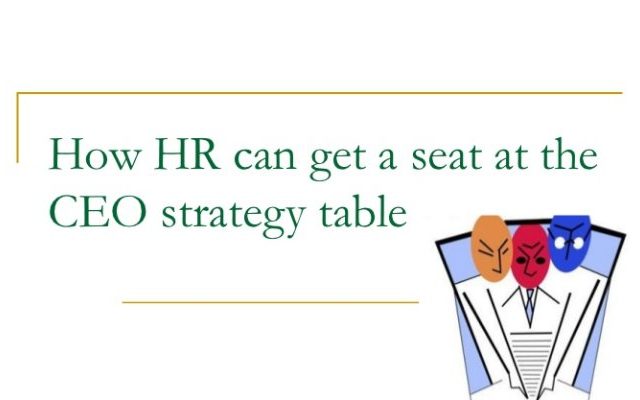There’s a lot of talk in ‘thought leadership’ circles around the notion of ‘let’s empower Human Resources,’ but here’s the thing to remember: most ‘thought leaders’ are consultants and coaches. They tend to get paid by companies hosting them to speak or engaging them to consult; when the rubber meets the road, they need to kind of fall in line with what the company is saying. Otherwise? The checks don’t keep clearing.
That’s the fraught thing about any attempt to empower Human Resources. Most current executives — Boomers to late Boomers — view Human Resources as a compliance function. It’s definitely not a profit center — and in the eyes of some of the worst executives, it’s essentially the Secretarial Pool V2, or ‘where you stash the hot 20-somethings you can kinda vaguely flirt with.’
Any conversation about ‘culture’ or ‘purpose’ or ‘organizational health,’ though … it can’t go anywhere without these things happening:
- Decision-makers have to actually care about it, instead of just saying it because it sounds good
- It can’t be instantly assigned to HR and then forgotten about as revenue-focused goals are chased
- It needs to be ‘owned’ by as many people as possible
It is time to empower Human Resources. Can we, though?
Empower Human Resources Idea: People Analytics
The idea of ‘people analytics’ — basically using data on people and their performance to drive decision-making around business needs and hiring — has been kicking around for a few years. At one level, it’s terrifying to executives because it replaces the long-held notion of “expertise” — i.e. an executive’s gut feelings about something — with actual, tangible data. If you do that across the board (beyond just HR), what’s the point of senior management anymore?
So if you do ‘People Analytics’ right, this is the transition:
“I like the cut of Bobby’s jib!” becomes “We analyzed the best performers in that role for the past 10 years; Bobby is a good candidate, but not the best one.”
See how this would scare people?
The fact is, though — organizations have reams (or should) of data on performance, who does what in specific jobs, how those people are evaluated, etc. You can argue some of it is all subjective, and that’s true. But if you have a position called ‘Marketing Manager II’ or whatever, and you’ve had it for a few years, chances are:
- 1-2 (or more) people have held it
- Their managers have assessed their strengths and weaknesses a few times (again, you’d hope)
- There’s some tie between that position and overall revenue goals/growth
If you have even 1/3rd of that data/information, you can begin to make some more informed decisions around recruiting and hiring — and at most places right now, hiring is an abject train wreck that was mostly derailed by big promises from technology.
If you talk to Human Resources people, one of the big things you always hear is that they want ‘a seat at the table.’ That means access to the meetings where shit actually happens and money is discussed, in general. Well, if you’re strategically using information to make better hiring decisions and those decisions are hitting the bottom line positively, well … there’s your seat at the table.
The Issue With People Analytics: We’d have to think about HR differently (that applies to everything in this post). We’d also have to staff HR differently, because you would need people with analytical or statistical skills (or the ability to learn that), as opposed to process-oriented people who claim to “love the culture here.”
Empower Human Resources Idea: Stop Using Them To Cover Your Ass
This one is kinda what grinds my personal gears. The majority of functions that HR gets assigned are basically just ‘cover your ass’ functions from other business units.
Consider, for example, what most people in most orgs consider to be the primary function of Human Resources: essentially, it’s Internal Affairs. If you do something — like send a picture of your wang to a co-worker — you’ll get reported to Human Resources, they will do some due diligence, and then you’ll sit down with your boss and some HR rep and get reprimanded (or fired). As a result, most people think of HR as narcs. How can you get a strategic seat at the table when people secretly fear you and what you might know about them?
Consider this too: the whole hiring process. Most hiring managers — the person who will eventually become the boss of the new hire — rush around screeching about how busy they are but also demanding headcount. Because they don’t want to heap other things on their plate, though, they assign the first stages of a new hire process to HR. The claim at this stage is always “Well, HR has the functional knowledge!” It’s a total cover-your-ass move, in all honesty. The first stages of a hiring process are typically short, generic conversations. There isn’t really ‘functional knowledge’ to that. A hiring manager could probably do it, and he/she might need to be briefed a bit on legal requirements for screening, etc. As a result of this whole cover-your-ass play, hiring managers and HR recruiters tend to communicate poorly, and good candidates get passed over because HR isn’t sure what the hiring manager wants. You’ve all probably seen this happen at least 10 times. I’ve seen it probably 150+. I’m not even saying I’m a good job candidate, but … I’m sure it’s happened to me as well.
Basically, here’s the problem: HR is a place where fires get put out. It’s transactional work, not transformative work. That needs to change if we want to empower Human Resources.
Empower Human Resources Idea: Find Revenue Ties And ROI
Most business leaders have this central idea that processes and products make you money, which is fairly myopic and flawed. Even if you have the most amazing product in the world — let’s say some super phone, OK? — your people still design that phone, develop it, market it, sell it, etc. Your money actually comes from the interplay of your people, but most people fail to understand that — especially executives. In a nutshell,that’s why no one really cares about ‘talent strategy.’
There are, however, ways that Human Resources can be closer to revenue and ROI — and that would help empower Human Resources and get them this ‘seat at the table.’ Some examples would be:
- Strategic hiring and People Analytics
- Headcount/revenue analysis
- People/performance analysis (overlapping job roles, which is a hidden cost at most companies)
- Cost via churn
- Time to hire revenue statistics
- Cost of replacing employees at different levels
- Measurement and metrics around employee engagement
- Data on the talent marketplace in the industry/vertical
It all comes down to these overlapping series of points, I think:
- Most executives tend to only care about (a) things that are measured and (b) things tied to money.
- Human Resources deals with neither in most companies.
- Ergo, HR doesn’t have its ‘seat at the table.’
If you want to empower Human Resources, then … you need to find ways to bring their functions closer to (a) the bottom line and (b) ROI. The reason most senior leaders lip-service things like ‘culture’ and ‘purpose’ and ‘churn’ is because no one has shoved a clear deck under their nose that says “Every time we lose a good employee, we lose $95,000.” Once they understand that connection, the ‘care’ and ‘seat at the table’ will be there.
Any other ways you can think to empower Human Resources?
My name’s Ted Bauer; I blog here regularly and you can learn about hiring me for freelance and contract gigs as well. You can also subscribe to my newsletter.
Article by channel:
Everything you need to know about Digital Transformation
The best articles, news and events direct to your inbox






